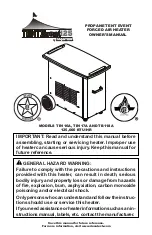
www.desatech.com
120942-01E
13
STorage
2. Place plastic cover caps over brass fittings
on inlet connector and hose/regulator as-
sembly.
3. Store in dry, clean, and safe place.
4. When taking heater out of storage, always
check inside of heater. Insects and small
animals may place foreign objects in
heater. Keep inside of heater free from
combustible and foreign objects.
CAUTION: Disconnect heater
from propane supply tank(s).
1. Store propane tank(s) in safe manner. See
Chapter 5 of S
tandard for Storage and
Handling of Liquefied Petroleum Gases,
ANSI/NFPA 58
and the
Natural Gas and
Propane Installation Code CSA B149.1.
Follow all local codes. Always store pro-
pane tanks outdoors.
MainTenance
WARNINGS
• Never service heater while it
is plugged in, connected to
propane supply, operating, or
hot. Severe burns and electri-
cal shock can occur.
• Keep heater clear and free
from combustible materials,
gasoline, and other flammable
vapors and liquids.
• Do not block the flow of com
-
bustion or ventilation air.
1. Keep heater clean. Clean heater annually
or as needed to remove dust and debris.
If heater is dirty or dusty, clean heater
with a damp cloth. Use household clean-
ers on difficult spots. Slight odor may be
present for a brief period following use of
household cleaners.
2. Inspect heater before each use. Check
connections for leaks. Apply a noncor-
rosive leak detection fluid to connections.
Bubbles forming show a leak. Correct all
leaks at once.
3. Inspect hose/regulator assembly before
each use. If hose is highly worn or cut,
replace with one specified by manufac
-
turer.
4. Have heater inspected yearly by a quali-
fied service agency.
5. Keep inside of heater free from combus-
tible and foreign objects. Remove motor
and other internal parts if needed to clean
inside of heater (see S
ervice,
below).
burner
Check burner air inlet after every 300 hours
of operation to ensure burner air inlet is free
of dust or debris. Use compressed air (30 PSI
or less) to clean out burner air inlet.
Service
WARNING: Never service
heater while it is plugged in,
connected to propane supply,
operating, or hot. Severe burns
and electrical shock can occur.
IMPORTANT: CHECK FOR GAS LEAKS.
Test
all gas piping and connections for leaks after
installation or servicing. Never use an open
flame to check for a leak. Apply a noncorrosive
leak detection fluid to all joints (available at lo
-
cal plumbing supply stores). Bubbles forming
show a leak. Correct all leaks at once.














































